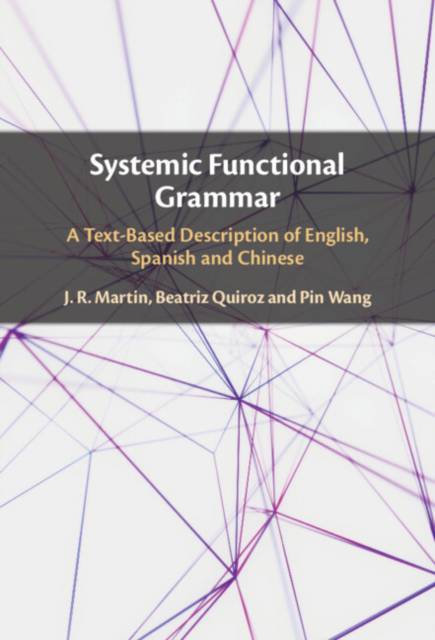
Door een staking bij bpost kan je online bestelling op dit moment iets langer onderweg zijn dan voorzien. Dringend iets nodig? Onze winkels ontvangen jou met open armen!
- Afhalen na 1 uur in een winkel met voorraad
- Gratis thuislevering in België vanaf € 30
- Ruim aanbod met 7 miljoen producten
Door een staking bij bpost kan je online bestelling op dit moment iets langer onderweg zijn dan voorzien. Dringend iets nodig? Onze winkels ontvangen jou met open armen!
- Afhalen na 1 uur in een winkel met voorraad
- Gratis thuislevering in België vanaf € 30
- Ruim aanbod met 7 miljoen producten
Zoeken
Systemic Functional Grammar
A Text-Based Description of English, Spanish and Chinese
J R Martin, Beatriz Quiroz, Pin Wang
Hardcover | Engels
€ 223,45
+ 446 punten
Omschrijving
Systemic Functional Linguistics (SFL) is a usage-based theory of language, founded on the assumption that language is shaped entirely by its various functions in the contexts in which it used. The first of its kind, this book advances SFL by applying it comparatively to English, Spanish and Chinese. By analysing English alongside two other, typologically very different major world languages, it shows how SFL can effectively address two central issues in linguistics - namely typology and universals. It concentrates in particular on argumentation, carefully explaining how descriptions of nominal group, verbal group and clause systems and structures are motivated, and draws on examples from key texts which display a full range of ideational, interpersonal and textual grammar resources. By working across three world languages from a text-based perspective, and demonstrating how grammar descriptions can be developed and improved, the book establishes the foundations for a groundbreaking functional approach to language typology.
Specificaties
Betrokkenen
- Auteur(s):
- Uitgeverij:
Inhoud
- Aantal bladzijden:
- 468
- Taal:
- Engels
Eigenschappen
- Productcode (EAN):
- 9781009285001
- Verschijningsdatum:
- 8/06/2023
- Uitvoering:
- Hardcover
- Formaat:
- Genaaid
- Afmetingen:
- 152 mm x 229 mm
- Gewicht:
- 802 g

Alleen bij Standaard Boekhandel
+ 446 punten op je klantenkaart van Standaard Boekhandel
Beoordelingen
We publiceren alleen reviews die voldoen aan de voorwaarden voor reviews. Bekijk onze voorwaarden voor reviews.











